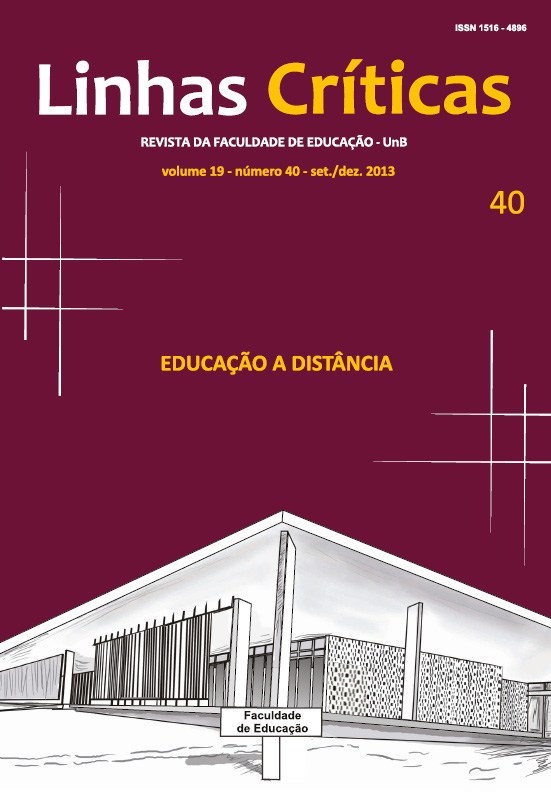Interest and the overcoming of learnification for philosophical practice
DOI:
https://doi.org/10.26512/lc.v19i40.4197Keywords:
Philosophy teaching, Education, Interest, Mediation, Philosophical practiceAbstract
The present paper discusses the concept of interest and the critique, by Gert Biesta, of the phenomenon of “learnification” of education, as the basis for the philosophical practice in the context of teaching philosophy. The problem of the text is formulated thus: what is the importance of interest and of the critique contained in the learnification concept, based on John Dewey and Gert Biesta, for a philosophical practice that can truly consolidate the teaching of philosophy? If philosophy claims a philosophical attitude in the teacher, this attitude seems to claim, as well, interest, based on a new vision of education that is not restricted to learning as the fundamental basis for philosophical practice.
Downloads
References
BIESTA, Gert. Beyond Learning: Democratic Education for a Human Future. Colorado: Paradigm Publishers, 2006.
BIESTA, Gert. Para além da aprendizagem: Educação democrática para um futuro humano. Trad. Rosaura Eichenberg. Belo Horizonte: Autêntica, 2013.
BIESTA, Gert. Giving teaching back to education: responding to the disappearance of the teacher. Phenomenology & Practice, Vol. 6, nº 2, p. 35-49, 2012.
BIESTA, Gert. Philosophy of Education for the Public Good: Five challenges and an agenda. Educational Philosophy and Theory, Vol. 44, nº. 6, 2012a.
BIESTA, Gert. Good Education in an Age of Measurement. Ethics, Politics, Democracy. Boulder: Paradigm Publishers, 2010.
BRASIL. Lei 11.684, de 21 de junho de 2008. Disponível em: http://www6.senado.gov.br/legislacao/ListaNormas.action?tipo_norma=LEI&numero=011684&data=2008&SUBMIT1=Pesquisar. Acesso em: 15 de abr. 2013.
CUNHA, Marcos Vinícius da. Jonh Dewey: Uma filosofia para Educadores em sala de aula. 2 ed. Petrópolis: Vozes, 1994.
DALBOSCO, Claudio. Natureza da pesquisa em educação. In HENNING, Leoni Maria Padilha. Pesquisa, ensino e extensão no campo filosófico-educacional. Londrina: UEL, 2010, vol. I.
DEWEY, John. Interest in Relation to the Training of the Will. In MCDERMOTT, J.J. (Ed.) The Philosophy of John Dewey: The lived experience. New York: Capricorn Books, 1973.
DEWEY, John. Interest and Effort in Education. New York: Touchstone, 1997.
DEWEY, John. Experience & Education. New York: Touchstone, 1997a.
DEWEY, John. Democracy and Education. Lexington: Feather Trail Press, 2009.
DEWEY, John. Vida e educação. Trad. Anísio S. Teixeira. 11. ed. São Paulo: Melhoramentos, 1978.
HUME, David. An Inquiry concerning Human Understanding. New York: Oxford, 1999.
JONAS, Mark E. Dewey’s Conception of Interest and its Significance for Teacher Education. Educational Philosophy and Theory, vol. 43, nº 2, pp. 112-129, 2011.
MENDONÇA, Samuel. Proposta de filosofia para o Estado de São Paulo: a autonomia do educador problematizada a partir de Was ist Aufklärung, de Kant. Cadernos de Educação UFPel, Pelotas, nº 39, pp. 135-152, 2011.
RANCIÈRE, Jacques. O Mestre ignorante. Cinco lições sobre a emancipação intelectual. Trad. Lilian do Valle. Belo Horizonte: Autêntica, 2002.
SASS, O.; LIBA, F.R.T. Interesse e a educação: Conceito de junção entre a psicologia e a pedagogia. Imagens da Educação, v.1, n.2, p.35-45, 2011.
Downloads
Published
How to Cite
Issue
Section
License
Copyright (c) 2016 Linhas Críticas

This work is licensed under a Creative Commons Attribution 4.0 International License.
Authors who publish in this journal agree to the following terms:
-Authors maintains the copyright and grants the journal the right of first publication, the work being simultaneously licensed under the Creative Commons Attribution License which allows the sharing of the work with recognition of the authorship of the work and initial publication in this journal.
- Authors are authorized to enter into additional contracts separately, for non-exclusive distribution of the version of the work published in this journal (eg publish in institutional repository or as a book chapter), with acknowledgment of authorship and initial publication in this journal.
-Authorers are allowed and encouraged to publish and distribute their work online (eg in institutional repositories or on their personal page) at any point before or during the editorial process, as this can generate productive changes as well as increase the impact and the citation of published work (See The Effect of Free Access).



